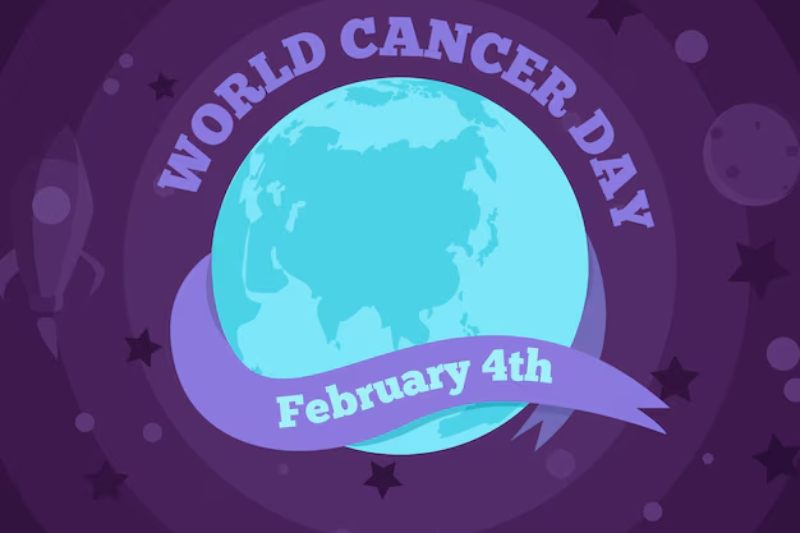
World Cancer Day 2025: Progress in Awareness and Treatment
- Healthcare
- January 30, 2025
World Cancer Day, an annual global event aimed at increasing awareness of cancer, advancing education, and spurring action to eradicate the illness, is celebrated on February 4th. As World Cancer Day 2025 approaches, it’s a chance to acknowledge the enormous progress that has been made in cancer awareness, early detection, and treatment while also acknowledging the work that still needs to be done.
The Effects of Cancer Worldwide
An estimated 10 million deaths worldwide are related to cancer each year, making it one of the major causes of death. The World Health Organization (WHO) estimates that cancer accounts for almost one in six deaths worldwide. Nevertheless, despite its enormous impact, cancer research and therapy have advanced significantly in recent decades, giving patients and their families hope.
Those who are fighting cancer, the medical professionals who are working relentlessly to save lives, and the organizations that offer support and education are all honored on World Cancer Day. The day also serves as a reminder of how critical it is to keep up the fight against cancer by promoting early identification and prevention through awareness campaigns and medical developments.
Developments in the Treatment of Cancer
Since its inception, cancer treatment has advanced significantly, with once-experimental medicines now becoming commonplace. Among the main areas where cancer treatment has advanced are:
Immunotherapy: By using the body’s immune system to combat cancer cells, immunotherapy has completely changed the way that cancer is treated. Patients who were previously thought to be incurable have benefited from treatments like checkpoint inhibitors, which have demonstrated notable success in treating diseases like melanoma, lung cancer, and several blood cancers.
Targeted Therapy: Designed to target particular chemicals implicated in the growth of cancer cells, targeted therapies are more accurate and less harmful to healthy, normal cells. This strategy has reduced side effects and improved patient outcomes for diseases like leukemia, colorectal, and breast cancer.
Personalized Medicine: By customizing treatments based on a patient’s genetic composition, personalized or precision medicine is revolutionizing the treatment of cancer. Doctors can prescribe more effective treatments based on the behavior of a patient’s cancer cells by examining the patient’s genetic profile. This strategy is assisting in reducing side effects and increasing the effectiveness of treatments.
Early identification and Screening: The likelihood of a successful course of therapy has increased due to the significant improvement in early cancer identification brought about by advancements in diagnostic technologies. Advanced imaging techniques and liquid biopsies are examples of non-invasive screening tools that are making it simpler to identify malignancies at earlier, more treatable stages.
Innovations in Radiation Therapy: Proton therapy and stereotactic body radiation therapy (SBRT) are two examples of how radiation therapy has progressed. These technologies enable physicians to more precisely target malignancies, minimizing damage to adjacent tissues and enhancing treatment efficacy.
Awareness and Prevention of Cancer
Even while therapeutic breakthroughs are important, early detection and prevention are still crucial for lowering the death rate from cancer. Organizations worldwide support awareness campaigns on World Cancer Day that emphasize healthy lifestyle choices, routine screenings, and lowering known cancer risks.
Lifestyle Decisions: Reducing alcohol use, eating a balanced diet, exercising frequently, and quitting smoking can all dramatically reduce the risk of getting some cancers. We can contribute to a global decrease in cancer incidence rates by promoting these preventive strategies.
Vaccination: Cancers brought on by viral infections are being prevented by vaccines such as the HPV vaccine. For instance, women’s cervical cancer and other malignancies linked to the human papillomavirus are being prevented by the HPV vaccine. Future cancer cases can be significantly decreased by raising immunization rates.
Public Health Campaigns: To raise awareness of the value of cancer screening and self-examination, numerous nations have started public health campaigns. Pap smears, colonoscopies, and routine mammograms can all aid in the early detection of cancer, when treatment is most successful.
Support for Patients: World Cancer Day also emphasizes how critical mental health and cancer patient support are. Just as difficult as the physical effects of receiving a cancer diagnosis can be the emotional and psychological toll. We can assist patients in overcoming the obstacles of treatment and recovery by providing them with community groups, counseling, and therapy.
Looking Ahead: Cancer Research’s Future
There is a lot of hope for the treatment of cancer as we approach 2025 and beyond. We are getting closer to a time when cancer is not a major cause of mortality because to ongoing investments in research, novel treatments, and technology advancements.
- By analyzing medical data and improving cancer outcome prediction, artificial intelligence (AI) is opening the door to earlier interventions.
- Certain types of cancer may be cured by using gene editing tools like CRISPR, which are showing promise in repairing genetic abnormalities that cause cancer.
- With current trials demonstrating encouraging outcomes in preventing the development of malignancies in high-risk persons, cancer vaccines are on the horizon.
Conclusion:
While we acknowledge that much more needs to be done, we also celebrate the advancements in cancer awareness and treatment on World Cancer Day 2025. We are getting closer to a time when millions of people won’t die from cancer every year with each new development in treatment. It is a day to celebrate the bravery of cancer patients, the researchers creating ground-breaking treatments, and the communities helping people along the way.
We can progress the fight against cancer by working together to increase awareness, support early detection, and encourage prevention. Let’s all be motivated to do our part to end cancer in the future on this World Cancer Day.